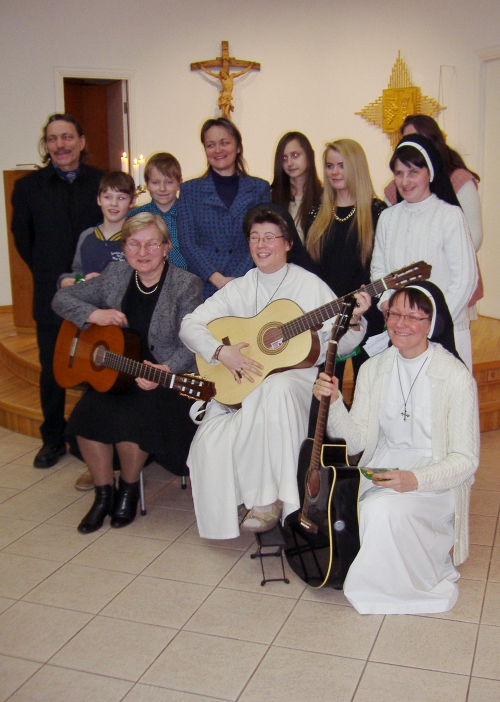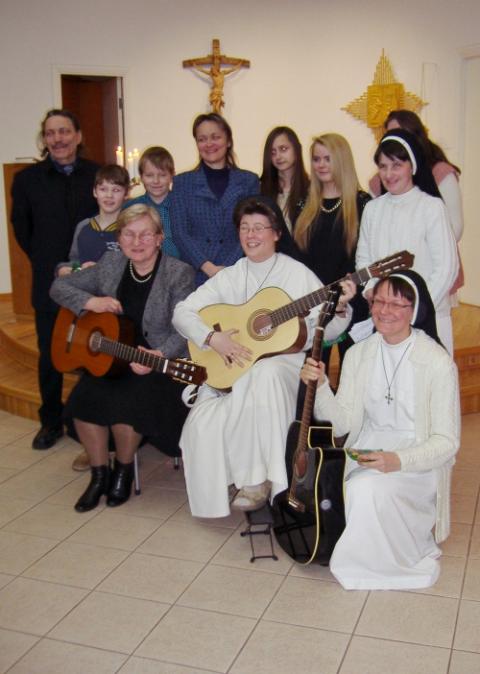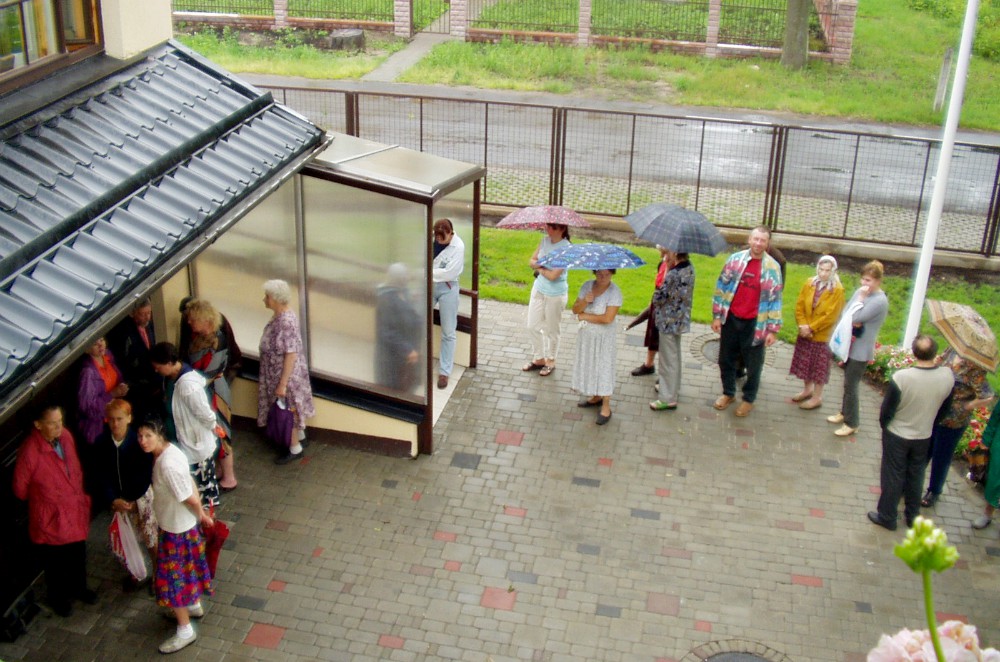
In the chapel of the Dominican Sisters of Bethany in Riga, Latvia (Provided photo)
Editor's note: GSR is celebrating the Feb. 2 World Day for Consecrated Life — a day of prayer for men and women in consecrated life — with a week of columns that illustrate some of the varied and unique ministries and contributions that consecrated women bring to the Catholic Church and society around the world.

In the chapel of the Dominican Sisters of Bethany in Riga, Latvia (Provided photo)
Our congregation began when a young French Dominican had an experience that turned his life upside down. Fr. Jean-Joseph (Alcide) Lataste was 32 years old when he was sent to give retreats in his hometown of Cadillac near Bordeaux in the south of France — in a women's prison.
There were 400 prisoners, many of whom had been raped by their boss, become pregnant and murdered their child. Most of them had no place in society on their release — only the law of rehabilitation. After release, the ex-prisoners entered a long time of "rehabilitation" to see if they had changed. Only then did the prisoner regain her civil rights — or not. Since it was assumed that the women remained dangerous during the time of rehabilitation, most were deported to the colonies of Guyana and Cayenne.
When Lataste started the first sermon of his retreat in 1864, he did something unusual: He looked at the women. He saw them as children of God, and began his sermon with the words, "My dear sisters." Unheard of!
Touched by this himself, he changed his sermons, and had deep spiritual experiences. For example, almost all the women — tired as they were after a day of forced labor — gave up their precious night's sleep to take part in night worship. He was deeply touched to think that God, who remained in the sacrament all night, did not consider himself to be too great to remain in the midst of these women. When God thinks and acts in this way, how can we reject people like these prisoners?
Lataste wanted more than a four-day retreat: He developed a vision for a house where women could live as sisters regardless of their past. A house where each would stand up for the others, and lift up her sisters. The idea for Bethany was born.
He loved the story of Bethany, where Jesus' friends Martha, Mary and Lazarus lived. Some equated this Mary with Mary Magdalene, who had been a sinner, and Lataste followed the view of Magdalene that was common at the time. Jesus loved to visit their home, and seemed to prefer Mary, telling Martha that Mary "has chosen the 'better part' and it is not to be taken from her" (Luke 10:42). Regardless, Mary Magdalene shows us that the greatest sinners can become the greatest saints.
The congregation of the Dominican Sisters of Bethany has spread to several countries, but its special charism sometimes causes unexpected troubles.
The mid-1980s, for example, there was a scandal surrounding Michelle Martin, who knew that her future husband, Marc Dutroux, had raped five girls. She was found guilty of raping a Slovak girl because she had poured the narcotic drug haloperidol into her coffee. The Belgian court sentenced Michelle Martin to five years' imprisonment. Dutroux was sentenced to 13.5 years. The two were married in 1988 in prison, and had three children.
A few years after his release, Dutroux kidnapped six girls, and Martin was aware of this. With Dutroux back in prison, she knew that two of them were still alive — locked up for months in his small, unheated cellar. However, she did not do anything to save the imprisoned children or to provide them with food. (She did feed the dogs). The girls died of starvation.
Martin was arrested, and claimed that she was afraid of Dutroux and could not escape his influence. She received the maximum sentence of 30 years, eventually divorcing him in prison. She asked for parole several times, but she could not be released early without a "safe place" where she could stay. It did not surprise us that journalists came to Bethany's superior general to ask us whether we could offer such a safe place. This was a difficult issue.
But this does not express the heart of Bethany. We were not founded to admit "outcasts," ex-prisoners, or undesirable people. Sure, we do take care of them — that's an expression of our charism. But it doesn't get at the deepest part.
Advertisement
In the time of Lataste, there existed shelters where women who had nowhere else to go lived lives of penance and humiliation next to monasteries of exemplary sisters. Sometimes that was their only chance not to end up in prison again.
But Lataste wanted more. He wanted a real community, a home, for people with a past. He envisioned a community where everyone could be the same. The outside world would not be allowed to know where someone came from. Those from good middle-class homes, with good reputations, would be equal to someone who had been in prison as a thief. Once a journalist asked a group of sisters if the ones who "had a past" could stand up. And the whole group stood up.
We humans like to categorize each other, trying to form a "right" image. This is related to our need for security: Is the other one a risk, a threat to me or not? And we believe that if we gather as much information as possible, then we can assess and judge a person. We draw a line from the past to the present and on into the future.
But in that way a person is chained to what he or she once was or did.
In the Gospel, God invites us to repent. God thinks every human being can change. This is the invitation of Bethany! You can change course, repent and allow God into your life. Then you might discover that God has a certain destiny for you, even a call to religious life.
When this happens, whatever you have done is beside the point. That's why in Bethany we don't have an age limit for entrance: Sometimes it takes a lifetime before someone discovers God's mercy for their own life, and the desire for a life as a religious grows.

People wait for food outside the convent of the Dominican Sisters of Bethany in Riga, Latvia. (Marjolein Bruinen)
Our congregation has official permission from the Church to admit women who legally cannot enter the congregation, (e.g. if they are married). Even today, these women cannot take a vow. That is why we do not take a temporary vow in Bethany. All sisters make a kind of temporary commitment and commit themselves to the congregation for three years. This is a big legal difference, and in this way the outside world can't tell who came to Bethany on which path. Only when it is time for perpetual vows do we make our profession.
Therefore, yes, there would also be room for Michelle Martin with us — but as a fellow sister (provided that we were convinced that she has actually converted, repented and has a vocation).
That is at the core of our mission, even today. We do other apostolic works, but our first apostolate is our sisterly community.
And as we get older, our tenacity, stamina and patience weaken, and we do whatever it takes when sickness, preparation for death, and death play an ever-greater role. Living in community is a strong testimony in a society where keeping in touch is no longer of paramount importance.
We wish you could attend a celebration in our chapel and hear our favorite song: the song of the "sunny, safe, dear house of Bethany."
[Born in the Netherlands, Marjolein Bruinen is a member of the Dominican Sisters of Bethany. Currently, she is the general secretary of the Union of the European Conferences of Major Superiors (UCESM).]







